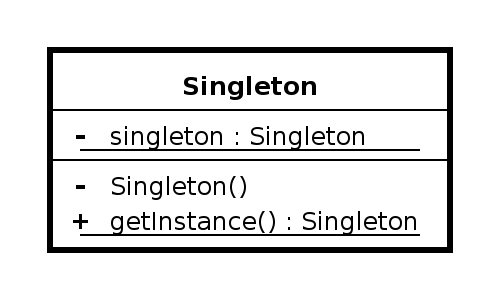Singleton Pattern
Finally, let’s look at one other common creational pattern: the singleton pattern. The singleton pattern is a simple pattern that allows a program to enforce the limitation that there is only a single instance of a class in use within the entire program. So, when another class needs an instance of this class, instead of instantiating a new one, it will simply get a reference to the single existing object. This allows the entire program to share a single instance of an object, and that instance can be used to coordinate actions across the entire system.
The UML diagram for the singleton pattern is super simple. The class implementing the singleton pattern simply defines a private constructor, making sure that no other class can construct it. Instead, it stores a static reference to a single instance of itself, and includes a get method to access that single instance.
Let’s look at how this could work in our ongoing example.
Singleton Factory
Let’s update our DeckFactory class to use the singleton pattern.
public class DeckFactory{
// private static single reference
private static DeckFactory instance = null;
// private constructor
private DeckFactory(){
// do nothing
}
public static DeckFactory getInstance() {
// only instantiate if it is called at least once
if DeckFactory.instance == null{
DeckFactory.instance = new DeckFactory();
}
return DeckFactory.instance;
}
public Deck getDeck(DeckType deck) {
// existing code omitted
}
}There are actually two different ways to implement this in Python. The first is closer to the implementation seen in Java above and in C++ in the original book.
class DeckFactory:
# private static single reference
_instance: DeckFactory = None
# constructor that cannot be called
def __init__(self) -> None:
raise RuntimeError("Cannot Construct New Object!")
@classmethod
def get_instance(cls) -> DeckFactory:
# only instantiate if it is called at least once
if cls._instance is None:
# call `__new__()` directly to bypass __init__
cls._instance = cls.__new__(cls)
return cls._instance
def get_deck(self, deck: DeckType) -> Deck:
# existing code omittedA more Pythonic way would be to simply make use of the __new__() method itself to create the singleton and return it anytime the __init__() method is called. In Python, when any class is constructed normally, as in DeckFactory(), the __new__() method is called on the class first to create the instance, and then the __init__() method is called to set the instance’s attributes and perform any other initialization. So, by ensuring that the __new__() method consistently returns the same instance, we can guarantee that only a single instance exists.
class DeckFactory:
# private static single reference
_instance: DeckFactory = None
# new method to construct the instance
def __new__(cls) -> DeckFactory:
if cls._instance is None:
# call `__new__()` on the parent `Object` class
cls._instance = super().__new__(cls)
return cls._instance
def get_deck(self, deck: DeckType) -> Deck:
# existing code omittedIn this way, any calls to construct a DeckInstance() in the traditional way would just return the same object. Very Pythonic!
See Singleton on the excellent Python Design Patterns website for a discussion of these two implementations.
Using a Singleton
Now we can update our main method code to use our singleton DeckFactory instance instead of creating one when it is needed:
public class CardGame{
public static void main(String[] args) {
// ask user for input and store in `deckType`
String deckType = "Standard 52";
Deck cards = DeckFactory.getInstance().getDeck((DeckType.valueOf(deckType)));
// game code goes here
}
}from typing import List
class CardGame:
@staticmethod
def main(args: List[str]) -> None:
# ask user for input and store in `deck_type`
deck_type: str = "Standard 52"
cards: Deck = DeckFactory.get_instance().get_deck(DeckType(deck_type))
# Python method described above means the code doesn't change!
# cards: Deck = DeckFactory().get_deck(DeckType(deck_type))
# game code goes hereWhy would we want to do this? Let’s assume we’re writing software for a multiplayer game server. In that case, we may not want to instantiate a new copy of the DeckFactory class for each player. Instead, using the singleton pattern, we can guarantee that only one instance of the class exists in the entire system.
Likewise, if we need a system to assign unique numbers to objects, such as orders in a restaurant, we can create a singleton class that assigns those numbers across all of the point of sale systems in the entire store. This might be useful in your ongoing class project.
